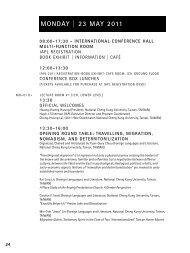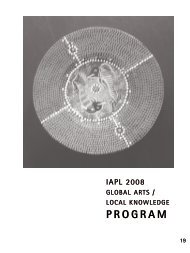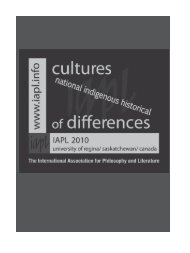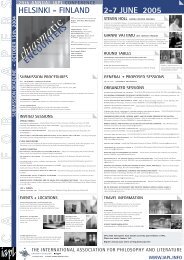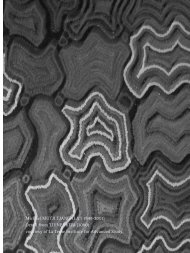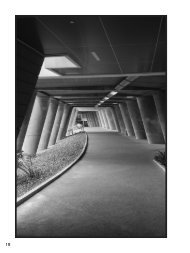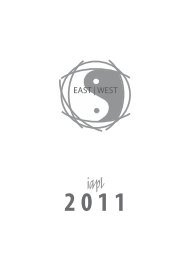IAPL2012-CB-0531-052.. - The International Association for ...
IAPL2012-CB-0531-052.. - The International Association for ...
IAPL2012-CB-0531-052.. - The International Association for ...
Create successful ePaper yourself
Turn your PDF publications into a flip-book with our unique Google optimized e-Paper software.
PLENARIES<br />
PLENARY SPEAKER<br />
JACQUES RANCIÈRE<br />
TALLINN UNIVERSITY, TALLINN HALL (M-218)<br />
WEDNESDAY, 30 MAY<br />
17:00-19:00<br />
Jacques Rancière (b. 1940 in Algiers) is Professor Emeritus<br />
at the Université de Paris (St. Denis). He first came to<br />
prominence under the tutelage of Louis Althusser when he<br />
co-authored Reading Capital (1968). After the calamitous<br />
events of May 1968 however, he broke with his teacher<br />
over his reluctance to allow <strong>for</strong> spontaneous resistance<br />
within the revolution. Jacques Rancière is known <strong>for</strong><br />
his sometimes remote position in contemporary French<br />
thought, operating from the humble motto that the<br />
cobbler and the university dean are equally intelligent.<br />
Jacques Rancière has freely compared the works of such known luminaries as Plato,<br />
Aristotle, Gilles Deleuze and others with relatively unknown thinkers like Joseph<br />
Jacototy and Gabriel Gauny.<br />
In Jacques Rancière’s vision, one finds a surprising level of trust in the word and<br />
the image, one of an almost anti-hermeneutical structure. Rancière is confident in<br />
language as a structure <strong>for</strong> identifying things and events in the world, while at the<br />
same time identifying the distance between words and things. Democracy then is the<br />
experience of the distance of things. Man acts as though his voice can be heard, but<br />
is always a proper distance from it. <strong>The</strong> problem, then, is not knowing what you are<br />
doing—the problem is to think about what you are doing, to remember yourself.<br />
Rancière’s books have covered pedagogy, the writing of history, philosophy, cinema,<br />
aesthetics and contemporary art. His critics have had a hard time defining him, placing<br />
him at different points as a philosopher, a literary critic, an art theorist and a Marxist.<br />
In Rancière’s words, thought is an expression of a condition. His work does not belong<br />
to a discipline but rather attempts to break the borders of a discipline. <strong>The</strong>re<strong>for</strong>e like<br />
Michel Foucault, Rancière has returned to the archives in order to re-examine the<br />
practices of historiography pitting the ideas of Plato on labor-time against the writings<br />
of a nineteenth-century worker about his own sense of time.<br />
Jacques Rancière’s translated works include: Reading Capital (1968), <strong>The</strong> Nights<br />
63



